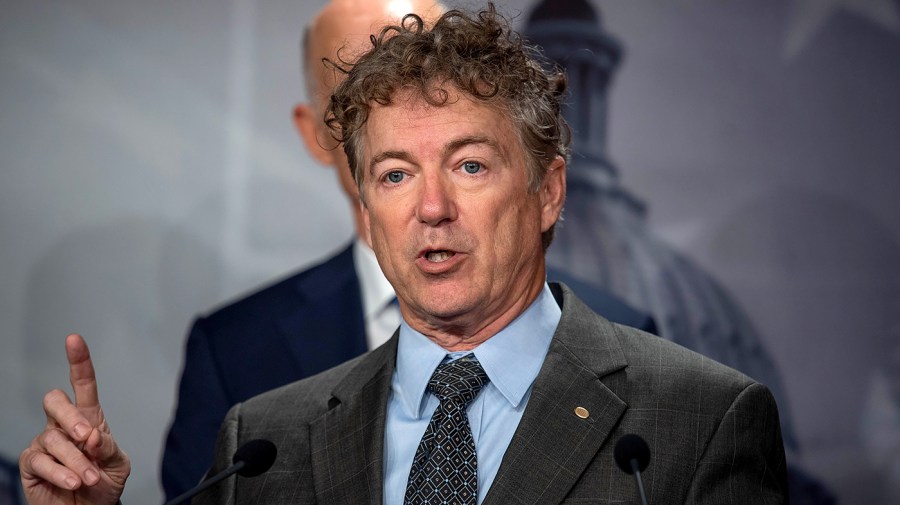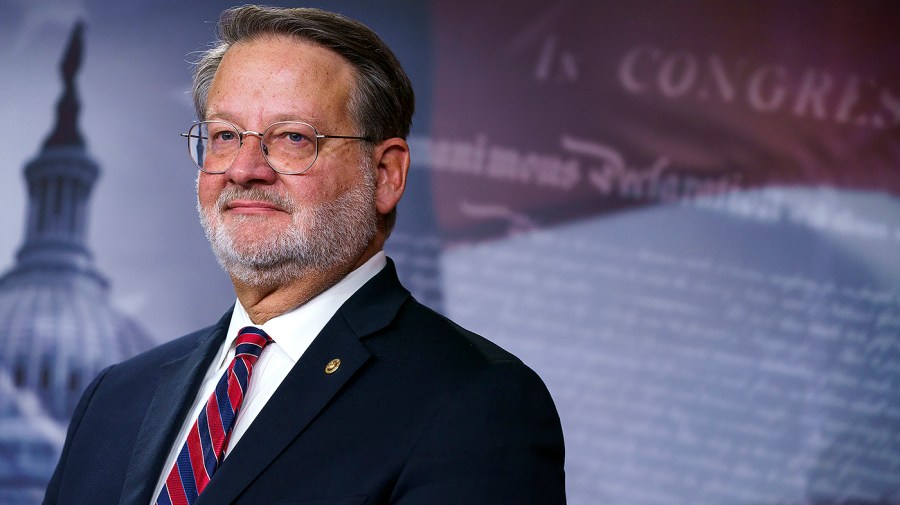Meltdown: Paul storms out of Homeland Security markup after clash on amendments
Sen. Rand Paul (R-Ky.), the ranking member on the Senate Homeland Security panel, abruptly walked out of a committee markup Wednesday morning after clashing with the panel’s chairman, Sen. Gary Peters (D-Mich.), over amendments.
Paul vented his frustration over Peters’s use of procedural tactics to effectively shield Democrats on the committee from voting on Republican amendments to the Fire Grants and Safety Act.
Peters offered second-degree amendments to the Republican-sponsored amendments that completely gutted their content.
At one point, Paul suggested that all the Republican members walk out of the committee meeting.
“If this is the way you’re going to run the committee, I would suggest that Republicans leave. I don’t see why we should stick around if you’re going to make up the rules,” Paul said hotly.

Sen. Rand Paul (Annabelle Gordon)
The atmosphere in the room got so tense that Sen. Kyrsten Sinema (Ariz.), who left the Democratic Party to become an Independent in December, suggested that “we all take a couple minutes, lower the temperature, just figure out the procedure.”
“There’s no need for us to turn this committee hearing into a partisan, ugly place like we’ve seen in other committees,” she pleaded.
Sens. Josh Hawley (R-Mo.) and James Lankford (R-Okla.) stayed in the room to vote against the amendments modified by Democrats after Paul walked out.
The acrimonious scene was a departure from how the Homeland Security Committee operated in 2021 and 2022, when Sen. Rob Portman (R-Ohio) served as the panel’s ranking member.
In the recent past, Democrats on the committee have sometimes sat on the Republican side of the dais and vice versa to promote a sense bipartisan camaraderie.
Paul took over as the top-ranking Republican on the panel after Portman retired in early January.
Paul said “this is the first time we’ve had a hearing since I’ve been here that I know of that we’ve gotten second-degree amendments on every one of our amendments.”
Lankford later sympathized with Paul’s frustration.
“Typically in that committee, we just have votes,” he said. “When we can’t work it out behind the scenes, we have a vote and not replace someone’s vote.
“We got to actually take votes,” he said.
The blow-up was triggered by Peters’s use of committee procedure to effectively block votes on the Republican amendments.
Paul offered an amendment to make any fire department that terminated firefighters for refusing a COVID-19 vaccine or speaking out against the mandate ineligible for federal grants.
Under Paul’s proposal, fire departments that fired employees for refusing vaccines could become eligible for federal money by offering those individuals reinstatement and backpay.
Peters, however, gutted Paul’s amendment by substituting language requiring the comptroller general of the United States to conduct an audit and report on barriers that prevent fire departments from accessing funds.
The modified amendment was adopted by a party-line vote with all Democrats present supporting the modified amendment and all Republicans voting no.
Paul then offered another amendment to broadly block any National Institutes of Health funding from going to China to fund “gain of function” research on coronaviruses at labs in Wuhan and other facilities.
The Kentucky senator has previously pointed to an Oct. 20, 2021, letter to members of Congress in which he says the National Institutes of Health admitted that research it supported was used to create more potent viruses in Wuhan.
Peters quickly offered a second-degree amendment that changed the language to prohibit any money in the Fire Grants and Safety Act “from being provided to a Chinese fire department.”
“That doesn’t make any sense,” Paul complained. “This is legislative legerdemain to obscure the fact that you’re trying to not vote directly on this.”
Paul then offered an amendment sponsored by Sen. Rick Scott (R-Fla.) to cover the costs of the $15.7 billion authorized over seven years by the Fire Grants and Safety Act with unspent COVID-19 relief money.

Sen. Gary Peters (Greg Nash)
He tried to block Peters from modifying the amendment by offering his own second-degree amendment that would block federal grants to fire departments that terminated employees who refused vaccines.
But Peters told Paul that he didn’t have jurisdiction to call up a second-degree amendment on the Republican amendment, sparking a heated spat over the panel’s rules.
“I already called up the second-degree amendment,” Paul argued.
“You can’t call it up, senator, only the chair,” Peters insisted. “You weren’t recognized to call it for a vote. Only the chairman can do that.
“The chair can call up the amendments as the chair sees fit,” he said.
Peters said after the markup that he remains open to working cooperatively with Paul.
“I look forward to working with Sen. Paul and hopefully we can find common ground to go forward. Some of the amendments he offered were not germane to the substance of the bill that we were dealing with,” he said.
Updated at 5:12 p.m.
Copyright 2024 Nexstar Media Inc. All rights reserved. This material may not be published, broadcast, rewritten, or redistributed..











